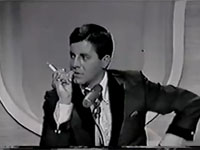Booklet Photos
Liner notes
Photos by Alan Smithee, Henry Diltz, Diva Zappa
Alan Smithee
Alan Smithee (also Allen Smithee) was an official pseudonym used by film directors who wish to disown a project, coined in 1968.
- Alan Smithee is also credited with photography on Philly '76 (2009)
Henry Diltz
Charles Ulrich, December 13, 2011
The photographs on pp. 13-15 (and probably those on pp. 22-23) were taken by Henry Diltz.
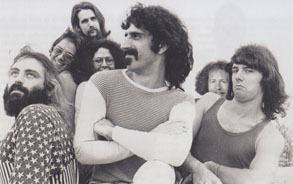
[From left to right: Howard Kaylan, Jim Pons, Ian Underwood, Mark Volman, FZ, Don Preston (pasted in), Aynsley Dunbar]
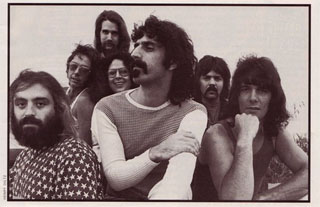
HENRY DILTZ [From left to right: Howard Kaylan, Jim Pons, Ian Underwood, Mark Volman, FZ, Bob Harris #1, Aynsley Dunbar]
Bruce Weber
Charles Ulrich, December 13, 2011
The photograph on the front of the box and those on pp. 8f., 10f., 20, 21, and 24 of the booklet were probably taken by Bruce Weber, who took the interior photos in The Official Mothers Of Invention Tourbook 1971.
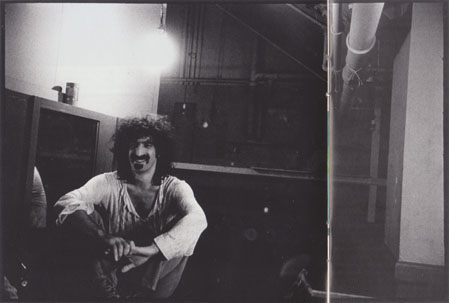
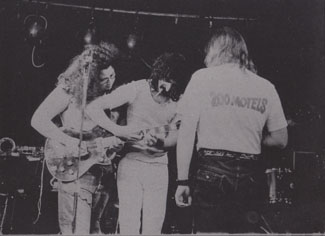
Bruce Weber (source and date missing)
FRANK ZAPPA
My first assignment in the music world was to go on tour with Frank Zappa—we went to three women's colleges: Vassar, Smith and Wellesley. We were only allowed to listen to his music on the road and he told me I was never to photograph him with other women. Well, by lunch I realised that I hadn't taken any photographs, so I decided to forget what he said and take a chance of being kicked off the tour bus. Frank and his family were all good friends of my sister and years later I photographed his daughter Moon—and let's just say that I was over the moon about her.
Diva Zappa
Charles Ulrich, December 13, 2011
The photograph of the tape boxes (pp. 6f.) was taken by Diva Zappa.
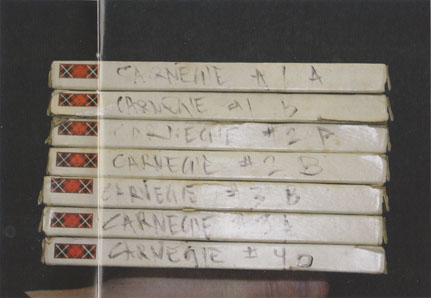
David Samuel
Charles Ulrich, December 13, 2011
The photograph of Carnegie Hall (p. 16) was taken by David Samuel.

Phil Franks
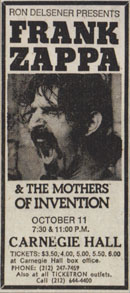
The Concerts
1971, CARNEGIE HALL. First off, Frank was CLEARLY pleased to be playing that venue. "Boys and girls, welcome to the desecration of Carnegie Hall!" were the first words he said. I think he was also very pleased that we had brought back the opening act, The Persuasions, for three or four encores. It was apparent from the look on The Persuasions faces as we standing ovationed them, that THEY couldn't believe it. We were largely a young, stoned out, white crowd, and they appeared to be astonished that we cared for them. I can't say much for that show because words cannot describe the relationship between how well the band played that night, and the acoustics offered by the hall. MAGNIFICO! The encore by The Mothers was The Mudshark. After the last regular number on the card ended, the band left the stage. We standing ovationed until Frank alone came back out. Here's what followed . . . .
"I've just been told by the management of this hall that if I want to use this stage past midnight, I have to pay an extra $600."
At this point people started to get up and put their jackets and coats on.
"Well I'll tell you what . . . . I'D BE HAPPY TO PAY 600 BUCKS TO PLAY FOR YOU PEOPLE SOME MORE!!!"
The place went crazy, the rest of the band came onstage, and Frank leaned into the mic and said, "This next song is dedicated to the prick in the back counting the overtime money."
Then came The Mudshark.
OMG!!!!!!!!! I was at this show! Remember that it was FANTASTIC! The band wuz REAL TIGHT that night!!! Odd that I can recall it 'cuz I was trippin' . . . . . People were trying to boo the Persuations off stage chanting "Zappa . . . Zappa . . . ."
Bob Glassenberg, Billboard, October 23, 1971
The stage of Carnegie Hall has been desecrated by many contemporary music groups in the past but it has never been done quite so artfully nor totally as it was with Zappa and his merry men. The Mothers have a way of satirically ripping apart everything for which an audience might live on the outside world. Once they took the stage, the world of New York and its surrounding areas become points of view, readily broken down into trivialities by seven musicians led by a nonchalant poet who couldn't possibly be as absurd as he wants everyone to believe.
Oddly enough, the music was quite real. There was no need to cover up vocals or instrumentals, for all the Mothers are true musicians. However, reinforcement is constantly needed in this area, for Zappa and his crew would seem to want people to believe otherwise.
Also appearing on the bill were the Persuasions. The a capella group made street corner singing seem simple with tunes such as "Cloud Nine," "Don't Look Back" and "Walk Like a Man."
Ira Mayer, "He Told Us So," The Village Voice, October 21, 1971
At their concert in Carnegie Hall last week, Zappa and the Mothers showed very clearly where they are headed. Oddly enough, however, their direction was only indirectly related to music. The only new piece they played was the encore, which Zappa explained was from the soundtrack of his movie, "Motels." All the rest were earlier works which seem to have grown less radical, in approach, with time.
Technically, it was a strong evening. The vocals, by two ex-Turtles, were excellent and included some fine harmonies. A drum solo in "King Kong," was on par with something you would normally expect of Buddy Rich. In general the group was tight, watching Zappa for his instructions and adhering to them as they came. The sound system (their own) even gave the opportunity to understand at least most of the lyrics. And the lighting served a purpose without becoming overwhelming.
My only objection is that they cheapened their show by playing to that small part of the audience that gawks and jeers at one or another gesture. The original Fugs had fun, and were funny, with that sort of thing, but Zappa and the Mothers don't need it. The music stands very well on its own, and even if all we learned on this particular night was that Zappa is into playing with different media (which isn't actually news), well that too is knowledge. Besides, someday he'll probably tell us he told us so.
It is funny, but I too saw Frank Zappa at Carnegie Hall, it happens. It is probably part of his current touring, so we undoubtedly saw the same show. I think that both things are true about Zappa—what you say and what your friend says. He is a genius, and he is silly. I know of no one in American rock who could equal him as a musician; I also know of no one like him who is so desperately clinging to adolescence, evn though like Miss Jean Brody, he is in the prime of his life. My own feeling is that a man who is nearly my age should stop making believe he is a high school sophomore and stop pampering to the most absurd portion of his audience. In point of fact, this is the contradiction not only in himself, but in the current rock scene as well. But as his music becomes increasingly sophisticated and specialized, his audience fades away, and in order to fill those huge ballrooms and get his big fees, he has to become a clown—or so he believes. It is really a tragedy, not just of a personal sort, but of the rock scene in general.
guygonzo1, Zappa-List@yahoogroups.com, December 19, 2011
I was at this show . . . front row.
A couple of "foggy" memories . . .
My buddy and I brought along a Varese lp to present to Frank. At the start of the show we walked the 10 feet or so to the stage (observing Bald Headed John emerge from the shadows towards Frank and us)and handed Frank the disc. I seem to recall him reading the cover and saying "Thanks for the album." On one of these cd's, at the start of the show (Auspicious Occaision) Frank says "It says Uncle Meat. Thanks for this." I don't recall anything about Uncle Meat, but I think the "Thanks for this." was directed at my friend and I for the album.
Another memory . . .
During one of the tunes, Mark was singing off key and I visibly cringed in my seat. Mark noticed this and looked at me and mimicked my expression. I made a different silly face and he responded in kind. This went on for a few more silly faces when I just cracked up and it stopped. He continued performing the whole time without missing a beat . . . now singing in key.
I also recall a good portion of the audience Mudsharking up and down the aisles of Carnegie Hall.
It was obvious as you drove up in a cab that the Carnegie Hall Mothers Concerts were complete sell outs. The cabbie marveled at the spectacle of a crowd of thousands of kids lining up to see, in his words, 'that pervert Zappa. What's Carnegie Hall coming to?'
Zappa agreed completely with the cab drivers views and opened the concert by declaring, 'Now for the ultimate desecration of Carnegie Hall.' Of course nobody believed that those hallowed halls were being desecrated for Zappa and the Mothers mesmerized everyone with their own particular brand of opera and haven't we always been taught that opera and ballet not necessarily in that order are beyond reproach. [...]
I heard Zappa's new opus Billy The Mountain for the first time a t this particular concert and was completely knocked out by it. It is in a piece like this that Zappa's genius becomes evident. The whole piece revolves around Billy The Mountain who makes a living by posing for picture post cards. One day he receives a royalty cheque from these post cards and Billy and his wife Ethel who is a tree that is growing out of his shoulder decide to go on a vacation to Los Vegas. They wreak so much havoc and destruction on the country side on their way that the United States government decides to draft him to go to Viet-Nam as a secret weapon. Well, Billy wouldn't have any of it so the government sends Studebacher Hoch, a secret agent to convince him to sign up. In the end though, Studebacher falls off of Billy and is killed. Don't screw around with Billy The Mountain. [...]
was more than one somebody getting off on what they were doing that night because the calls for encores caused a bit of a union problem as far as the time the show was supposed to end.
"In the middle of my guitar solo at the end of Billy the Mountain, Howard (Volman) came over and said, 'If we don't get off the stage in six minutes, it's going to cost us another six hundred dollars. So I had to compress everything down and we got off the stage at exactly the minute, right to the dot, to keep form paying that fine. The audience wanted an encore so what are you going to do? If I walked back on the stage and didn't play an encore, r could probably have still been liable for the six hundred just for going back on there. You have to be off the stage. I just decided it was worth the money. They'd get a few more bucks and the audience would get a Mudshark."
The Mudshark is a dance that the Mothers invented which entails clasping hands between legs and hopping around. The concert ended when Mark Volman and Howard Kaylan hopped their way up the aisles of Carnegie Hall and into the street with nearly the whole audience following.







